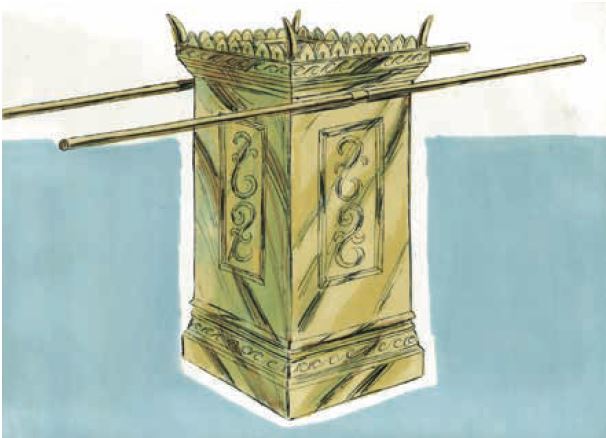[The LORD said to Moses,] “Make an altar of acacia wood for burning incense. It is to be square, a cubit long and a cubit wide, and two cubits high—its horns of one piece with it.” (Exodus 30:1-2)
Another angel, who had a golden censer, came and stood at the altar. He was given much incense to offer, with the prayers of all God’s people, on the golden altar in front of the throne. The smoke of the incense, together with the prayers of God’s people, went up before God from the angel’s hand. (Revelation 8:3-4)

In the temple of Jesus’ day, a priest could expect that he would be selected for the honor of offering incense on the altar of incense just once in his life. As best as we can tell, there were some 9,000 priests who served on a rotating basis in the temple throughout the year, and the various important duties (such as offering the incense) were chosen by lot during the two-week time of service. So, the one time in his life that Zechariah was given the honor of offering up incense in the Holy Place was the very time that an angel appeared to him, announcing John’s coming birth.
As we learned in our Lutheran Catechisms, one of the great works of Christ is to intercede for us as our great High Priest. The altar of incense foreshadows this work, and was designed by God himself to teach his people two important things.
The first is this: the altar of incense preaches a comforting truth, namely, that our prayers do indeed ascend heavenward toward the throne of God, and God himself invites us to pray without ceasing to him. The beautiful scene from Revelation reminds us of the privilege of prayer, and that as one half of the globe goes to bed each night with prayers on its lips, the other half is rising to a new day with praise on its tongue. And so the prayers of the Church are unceasing throughout the world from morning until night.
But this altar also teaches us that there must also be a mediator for our prayers. For we simply cannot approach a holy God in our sinfulness, believing that our own worthiness should somehow be enough to secure an audience with the holy King of kings. So it was that only the priest could enter the Holy Place and put incense on the altar, and make intercession for the people.
The tabernacle and temple are both long gone, and with them, the altar of incense. Yet in this Holy Week we see Jesus, the High Priest whom we confess. Although during this week we rightly focus on the sacrifice for sin he made on the cross of Good Friday, we are reminded today also of our Savior’s continuing role as intercessor for us at the throne of grace. We still need a mediator, and because Jesus rose from death, “he lives to plead for me above.” Because he has washed away our sins with his own blood and made us his children through baptism, we can go to our Father, praying in Jesus’ name, asking for all we need. And because our High Priest still lives, we know that God hears and answers us.
Let my prayer rise like incense before you, O Lord, and the lifting up of my hands as the evening sacrifice. Give us faith, O Holy Spirit, to hold on to your promise, that whatever we ask in Jesus’ name, our gracious Father will hear and answer us. Amen.
Rev. Dr. Keith Wessel serves Martin Luther College as a professor of Greek, Latin, and philosophy.



